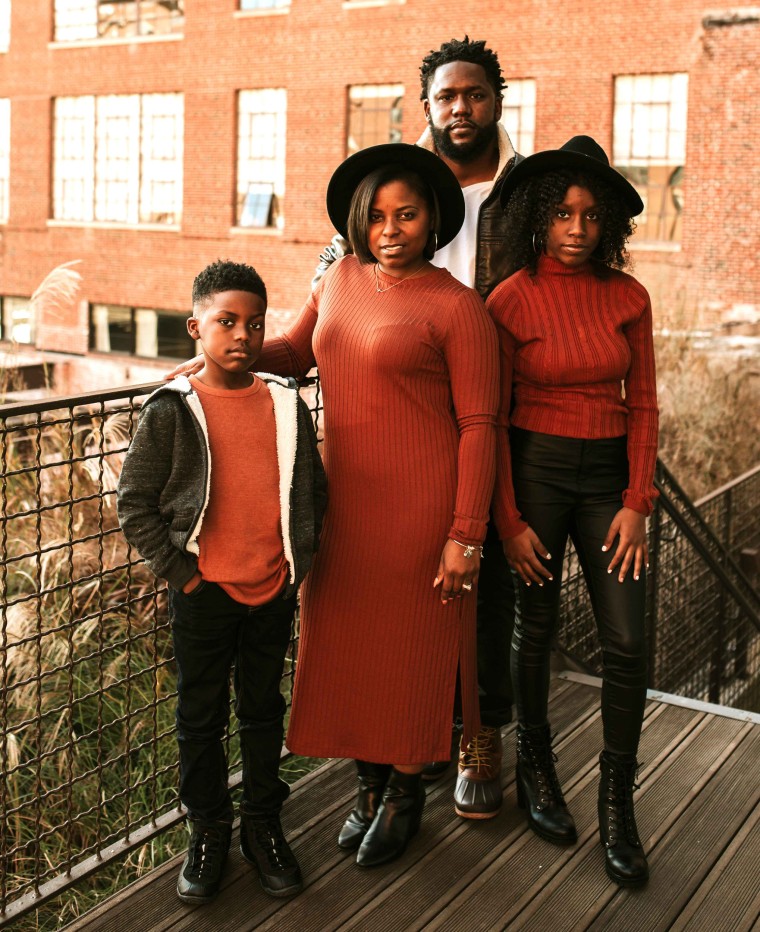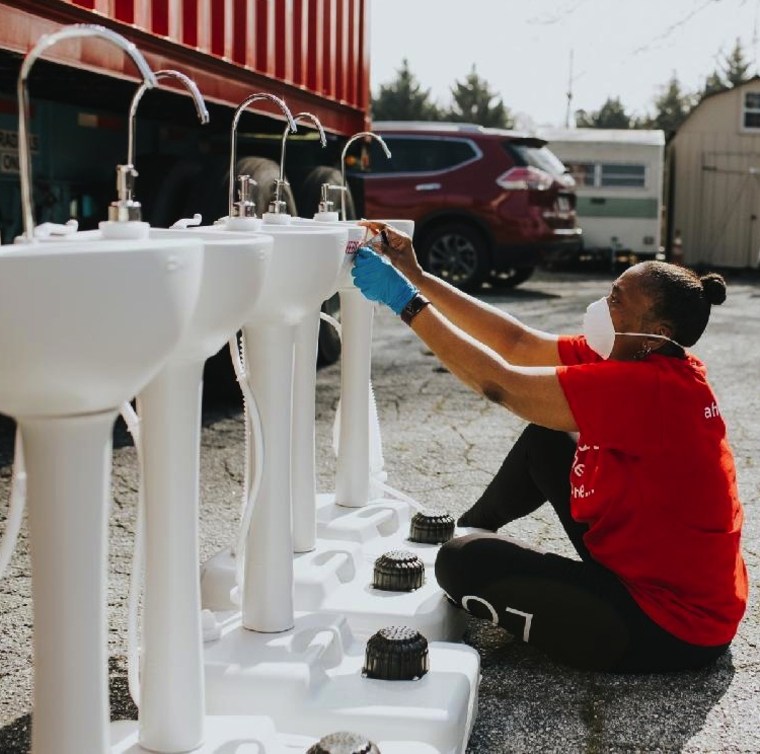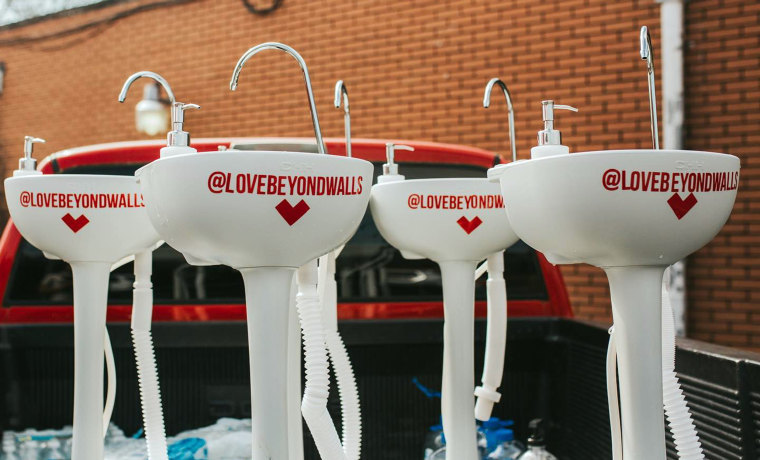Terence Lester has spent nearly half his life helping people dealing with homelessness live with dignity.
When the pandemic began to overtake cities and stretch hospitals to capacity, he understood the existential challenges the homeless would encounter as they tried to avoid contracting the deadly virus. One simple obstacle: hand-washing.
“The coronavirus hit and public places where they would go to wash their hands — restaurants, libraries, stores, etc. — were shut down,” said Lester, who runs Love Beyond Walls, an award-wining Atlanta-based organization that has reimagined how to provide and advocate for the homeless.
An idea came to his wife, Cecilia Lester, as she stood in the family’s kitchen one evening last year: place portable sinks throughout the city so homeless people could wash their hands without issue. Soon after, they created Love Sinks In — portable sanitation units that carry 5 gallons of water and come with hand soap.
Lester found a vendor in Florida who built the sinks, which cost $100 each and have been paid for primarily by donations. The rapper Lecrae purchased the first 15.
Initially, 51 sinks were placed under bridges, in parks and other locations around Atlanta where the city's 3,200 homeless gathered.

The concept was so well received that Love Sinks In are now in 52 cities, including Dallas, Chicago, and Columbus, Ohio.
“Laws have created this framing that to be poor or experience homelessness means you are a criminal or that you have done something or should be feared or kept at a distance,” Lester, 38, said. “So there has been this social isolation they experience.
“Our work is deeply gratifying. We work primarily with Black people who deal with systemic racism that leads to impoverishment. So I’m always thinking: Can we do more, get people involved in this issue of homelessness?”
The idea of “more” is “what keeps us going,” Cecilia Lester, 36, said. And more is coming from Love Beyond Walls in the form of portable showers. Terence Lester said he had asked a homeless person how he kept himself clean and he told him he would “pray for rain so he could catch rainwater in a bucket.” And with that the idea of portable showers was born.
They have created a prototype that will hold 250 gallons of water, have a tankless water heater and serve as still another way Love Beyond Walls helps people without homes.
“I am impressed with how young the Lesters are, with such open hearts, to do the work they are doing,” said Pamela Hill-Wright, who has volunteered with Love Beyond Walls since 2017. “The feeling of working with them and doing something for someone else is indescribable.”

The Lesters’ role as activists for the homeless is a far cry from where they began. Terence Lester said he almost did not graduate from high school and had spun into a life of trouble with the law and gang membership. An encounter with the legal system in rural Georgia sent him on a path he never expected.
At 20, Lester was brought before a judge and watched as other men in orange jumpsuits were sentenced to years in prison.
“When it was my time to face him,” Lester recalled, “he looked at me and my mom and said: ‘I don’t know why, but I’m going to give you a second chance. It’s your only second chance.’”
By the time the judge offered him a reprieve, Lester said he had already determined that his life would have to take a different course.
With that opportunity to reboot his life, Lester, who had run away from home, moved back in with his mother. He wrote poems that spoke to his pain — and hopes. He began performing his poetry, and was lauded for its depth. When a friend invited him to church, he performed once more — and was inspired to join Word of Faith Cathedral, where he was mentored by Bishop Dale C. Bronner.
Soon after, he met Cecilia when he was visiting her college campus.
“Eventually, he invited me to his church,” she said. “He already was on a straight-arrow path” to becoming a minister. “He had dreams. But I didn’t want to be a pastor’s wife.”
Love won, however, and they got married and began ministering over a small church in suburban Atlanta. As part of their ministry, the Lesters did work for the homeless, or as Terence Lester calls it, “love beyond the walls of the church.”
But building a church was challenging. A friend at dinner asked the Lesters, “What’s working for you?” and they answered, “Working with the homeless.” The friend asked, “Why not focus on that?” And so, they did. They created Love Beyond Walls, which innovates at every opportunity. The organization offers a Mobile Makeover program that provides hair care and grooming services, and a Mobile Stay program allows the homeless to take temporary shelter in the organization’s mobile home.
Its Closet of Hope provides clothing for community members and school uniforms for students. They also provide free access to washers and dryers, as well as drinking water. Their program Love Feeds, run in partnership with Warehouse of Hope, provides groceries for up to 500 families in need a month.
Lester estimates that he has helped more than 320 men get off the streets by reuniting them with family or getting them placed in shelters.
“Homeless is very unsettling to me,” Cecilia Lester said. “Not all of us have homes and many people are a paycheck away from being homeless. ... Doing this work was not in my plan. But it is amazing work.”
Phyllis Williams, who was homeless for a year, has benefitted from Love Beyond Walls for seven years, and has directed those in need to the organization. Williams, 62, said she was not “rich or poor” but needed help." Were it not for Love Beyond Walls, she said she and her family would "have nothing today."
In the years since, Williams said she has referred other people struggling with financial instability to the organization. “I told them: ‘Go down to Love Beyond Walls. Pastor Terrence will help. If he doesn’t have it, he will get it.’ They’ve been a miracle.”
Lester, who is studying for a doctorate in public policy and social change at Union Institute & University in Cincinnati, has written two books on the realities of homeless and service: “I See You: How Love Opens Our Eyes to Invisible People” and the upcoming “When We Stand: The Power of Seeking Justice Together.”
The Lesters’ efforts have already funneled into their children, Zion, 12, and Terence Jr., 10. The family came upon a homeless man on the street as they drove through downtown Atlanta five years ago. The parents noticed their son, 5 at the time, was crying in the back seat. When he asked why, Lester said his namesake pointed at a man holding a sign on the street and said it made him “sad because that man doesn’t have a home.”
Lester asked if he wanted to talk to the man and the son said he did. Lester partially rolled down his window and invited the man over to the side of the car where his son sat. Terence Jr. told him, “I just want you to know that I’m your friend and I love poor people.” And the man smiled. “Young man, you made my day,” Lester recalled him saying to Terence Jr.
Around the same time, Zion started a campaign when she was in the second grade for her classmates to collect change to give to the homeless when they encountered them.
“Sometimes the best education is what you catch and pick up just being in proximity,” Lester said. “We always include our children in our work. We have a lot of conversations about giving back, but it’s more about them learning from watching. And it’s developed a level of empathy within them. And that’s what we all need.”

